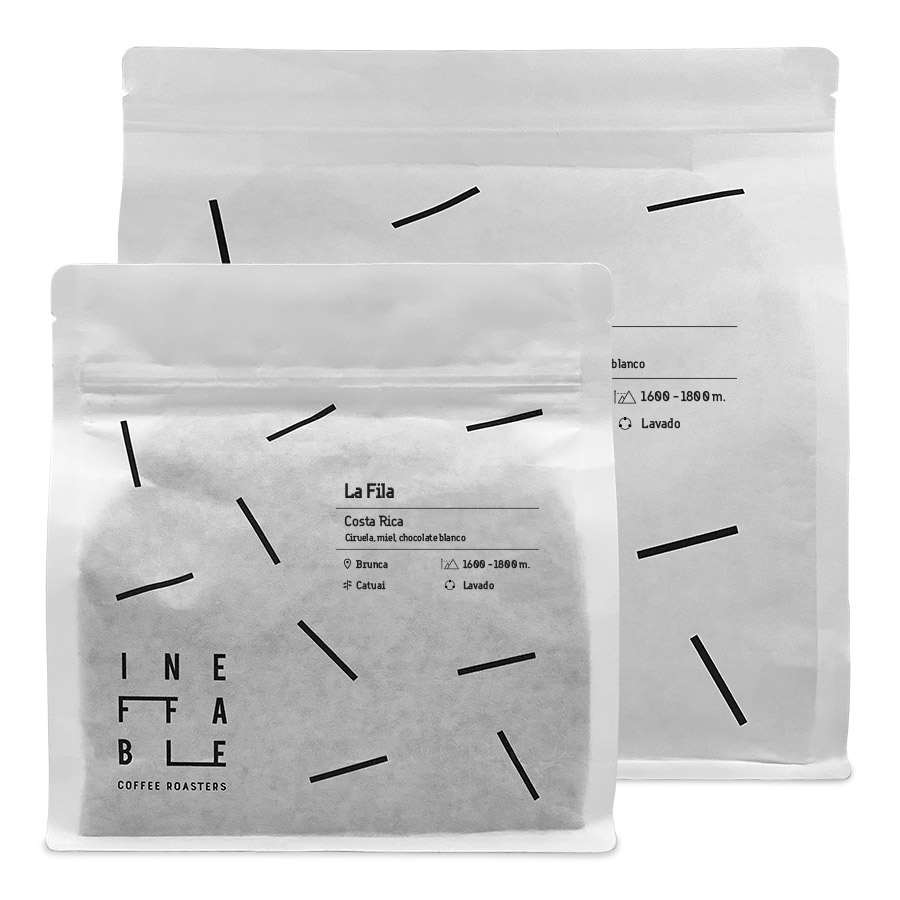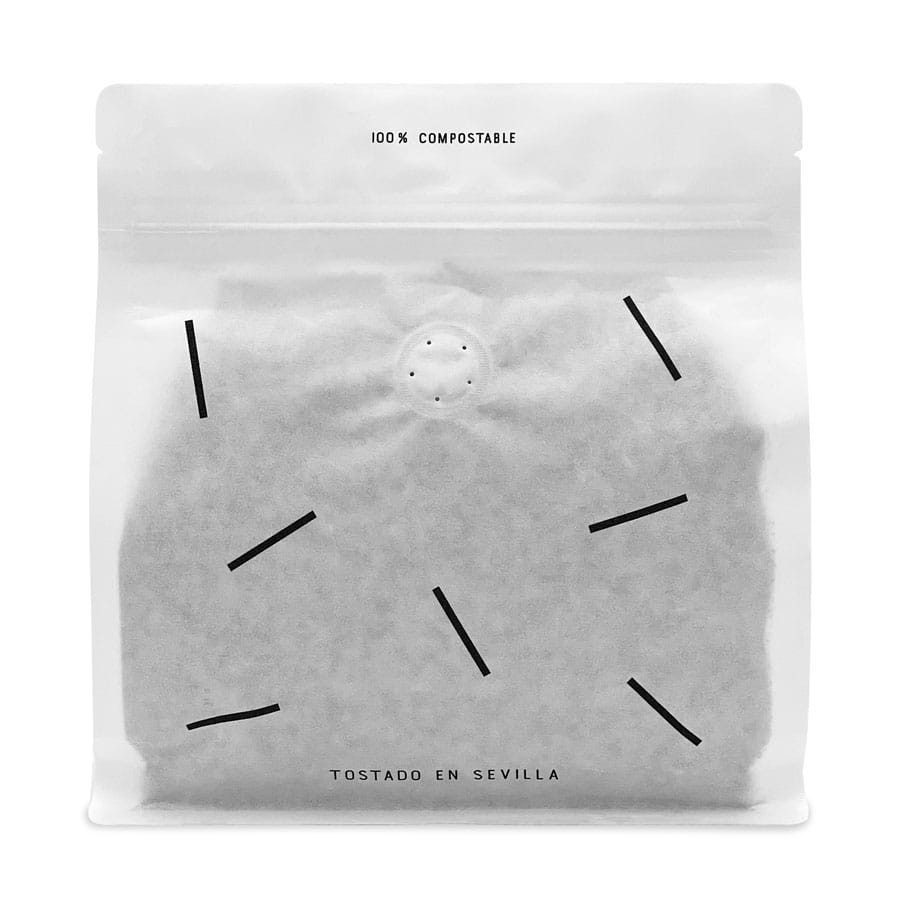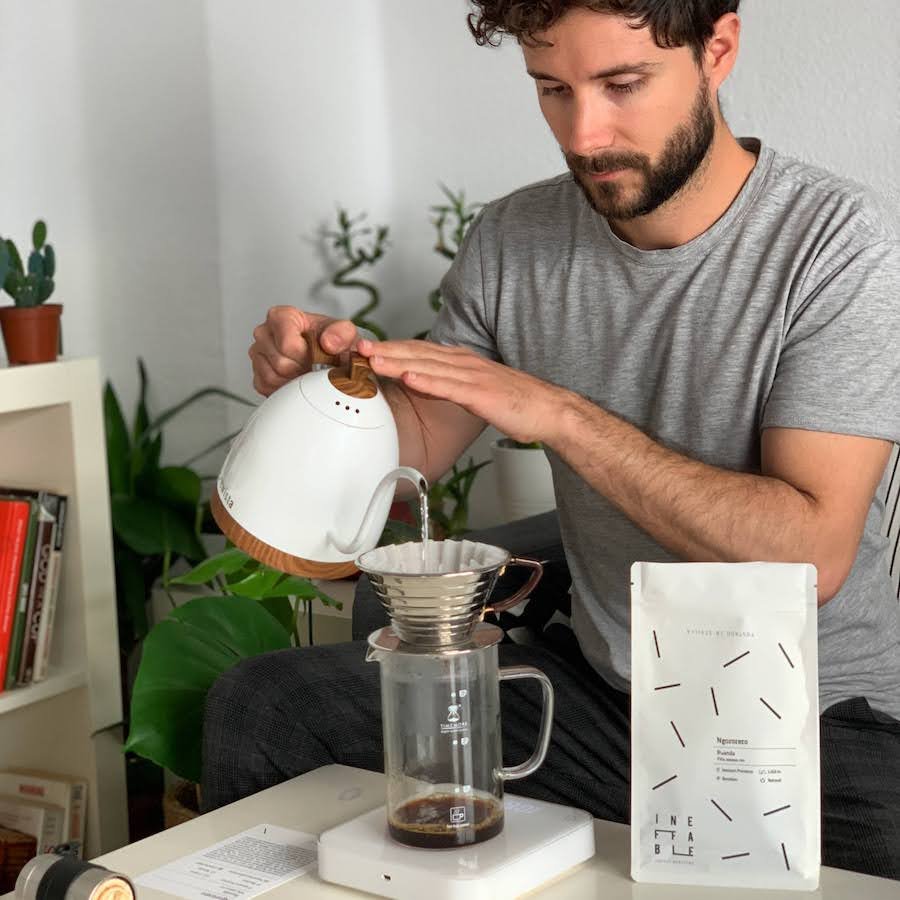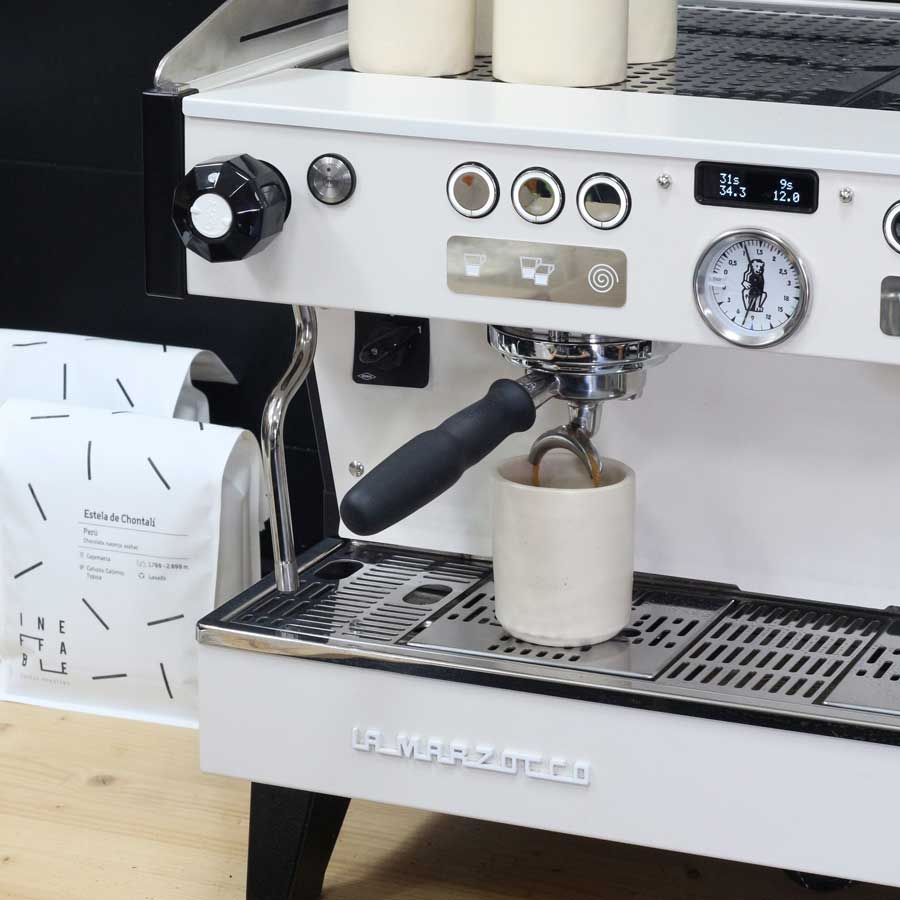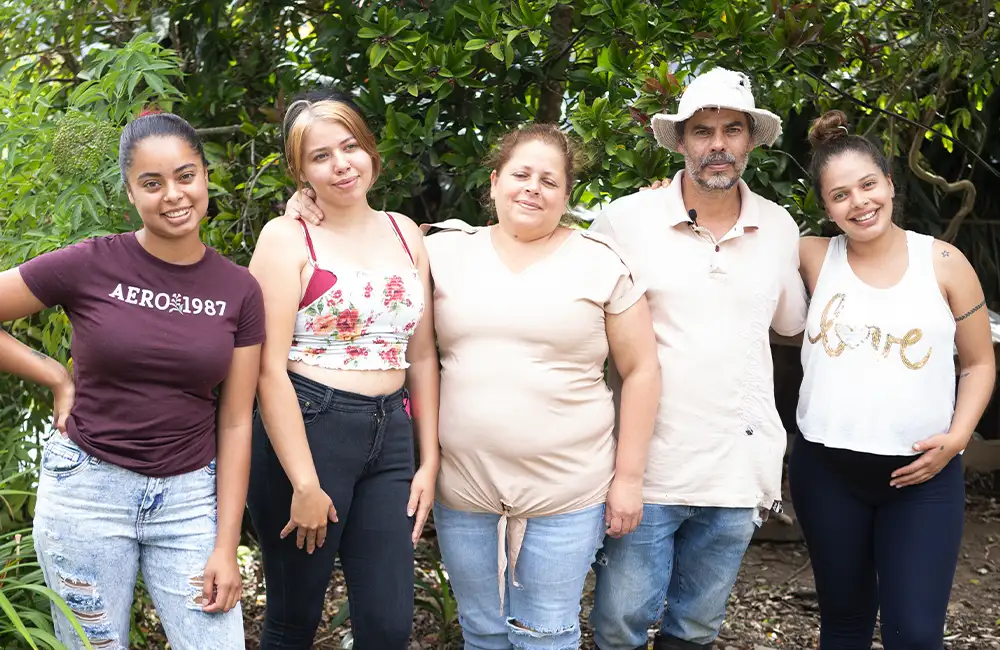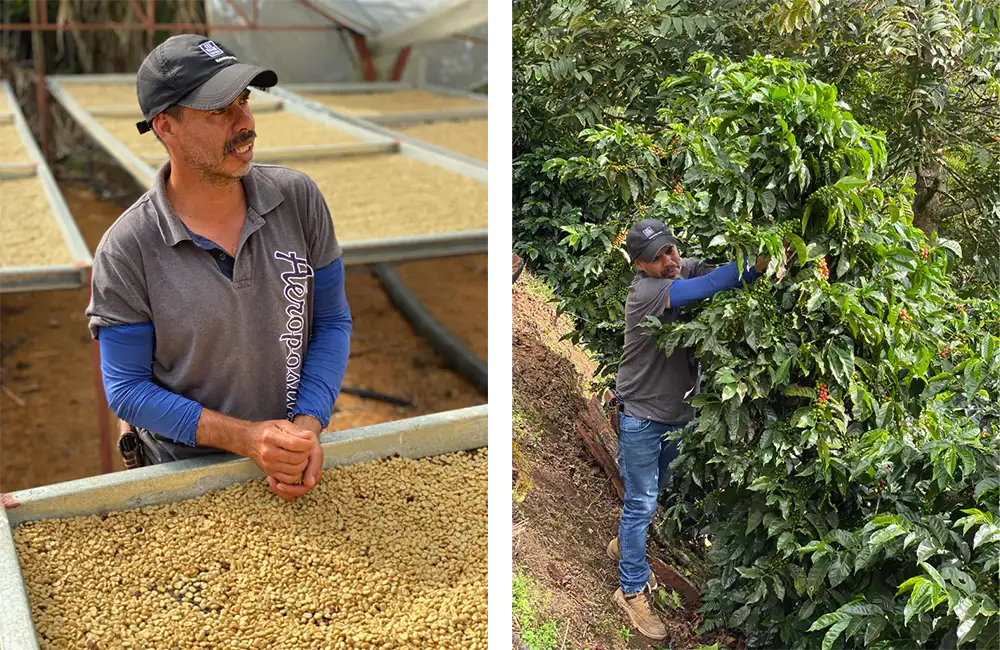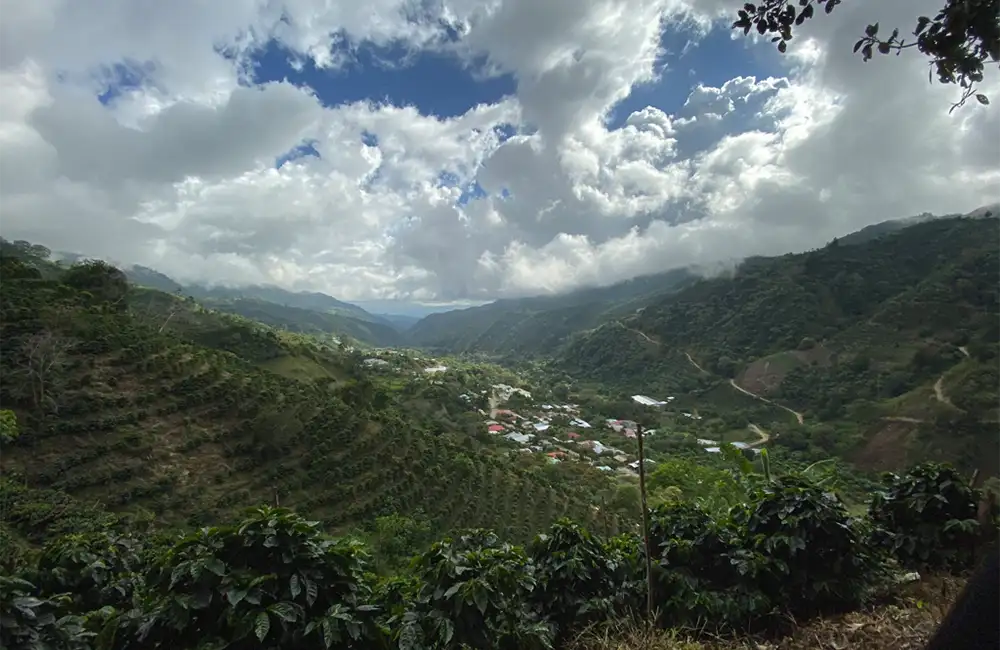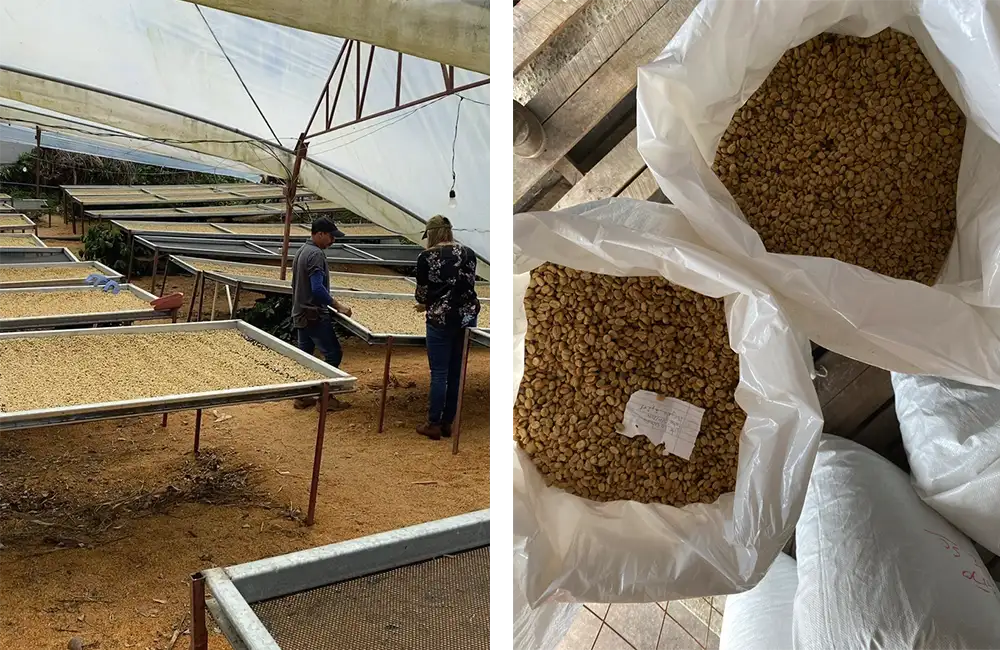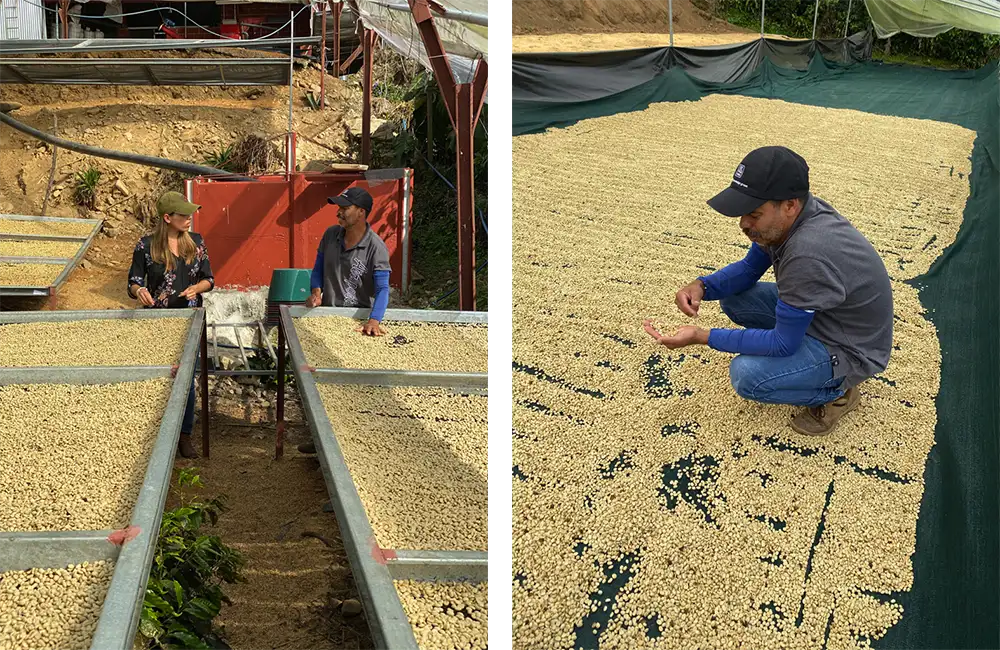La Fila – Costa Rica – Washed
17,00€ – 62,00€ VAT included
| Brewing method: Filter & Espresso | |
| Cupping notes: Plum, honey, white chocolate | |
| Process: Washed | |
| Varietal 100% Arabica: Catuai | |
| SCA Score: 88 | |
| Producer/s: Wendy Alvarado | |
| Region: Brunca | |
| Altitude: 1600 – 1800m. | |
| Harvest: 2024 |
- Description
- Additional information
- Shipping
- Meet the producer
- IneffablePoints
- Cold Brew Recipe
- Espresso Recipe
When Wendy Alvarado and her sisters decided to take a chance on cultivating specialty coffee at their farm, La Fila, in the Brunca region of Costa Rica, it was something innovative.
This area was not considered ideal for coffee cultivation. Wendy and her sisters have managed to take advantage of the altitude, the rich soil, and the climate, combined with a lot of effort, passion, and knowledge, to produce an exquisite coffee that has changed the perception of the entire region.
Their parents, lifelong farmers, are very proud. The cherries are always hand-picked at their optimal ripeness.
They are then depulped and undergo a classic washed process before being dried on raised beds for 12-15 days.
The washed process imparts a clean and delicate cup profile.
Additional information
| Weight | N/A |
|---|---|
| Whole bean-Ground: | Whole bean, Ground for French Press, Ground for Cold Brew, Ground for AeroPress, Ground for V60, Ground for Chemex, Ground for Moka Pot, Ground for Espresso |
| Pack size: | 250 gr., 1 kg. |
| Brand: | Ineffable Coffee |
| Filter-Espresso | Filter & Espresso |
| Preparation: | Filter Chemex, Filter V60, French Press, Behmor / Moccamaster, Espresso, Superautomatic, Italian Moka, AeroPress, Filter coffee machine |
| Flavour profile: | Fruity, complex, medium acidity |
| Process: | Washed |
Spain (Mainland), Balearic Islands & Portugal
- Free shipping for orders above 40€ for Spain (mainland), Balearic Islands & Portugal
- For orders below 40€, shipping cost is 4€.
- We will not ship at all to the Canary Islands, Ceuta, Melilla and Gibraltar.
- You will receive tracking via email for all shipments.
- Delivery times are fulfilled in 99% of shipments. Please note that we are subject to the proper functioning of our external logistics partners.
- National and/or regional public holidays may affect estimated delivery times.
- Delivery to mainland Spain in 24/48 hours, M-F.
- Delivery to Balearic Islands in 3/5 days, M-F.
- Delivery to Portugal in 3/5 days, M-F.
Europe
- Free shipping for orders over 99€ including coffee and some small accessories.
- Countries included: Austria, Belgium, Bulgaria, Croatia, Czech Republic, Denmark, Estonia, France, Finland, Germany, Greece, Hungary, Ireland, Italy, Latvia, Lithuania, Luxembourg, Monaco, Netherlands, Poland, Romania, Slovakia, Slovenia and Sweden.
- For orders below 99€, the shipping costs will be automatically calculated when you enter your shipping address in the shopping cart.
- Delivery in 4/7 days, M-F.
- You will receive tracking via email for all shipments.
- Delivery times are fulfilled in 99% of shipments. Please note that we are subject to the proper functioning of our external logistics partners.
- National and/or regional public holidays may affect estimated delivery times.
- We will not ship at all to the United Kingdom, Switzerland, the USA or any other third country.
Costa Rica Coffee produced by women
Nestled in a region in southern Costa Rica, the Joicafe farm has the beautiful name “Hope in God.” Here is produced one of the best Costa Rica Coffees.
Founded in 2016 by Wendy Alvarado and her two sisters, this farm has flourished to acquire an enviable reputation in the industry, thanks to their effort and work in their own wet mill.
At an altitude of between 1,600 and 1,800 meters above sea level, in the subregion of Buena Vista de Rivas at the foot of the imposing Chirripó, the highest point in Costa Rica, Joicafe is an example of entrepreneurship and coffee making in the Brunca region.
Wendy and her sisters have transformed the agricultural tradition of the Alvarado family, who were dedicated to raising cattle and growing tomatoes. This area had never been considered appropiate to the cultivation of Costa Rican coffee.
However, Wendy and her sisters, taking advantage of the altitude, quality of the land and the climate, have succeeded where many did not see it possible. Their parents are very proud of them.
Cultivation and Process
The farm has three hectares of fertile and prosperous land and they grow the Catuai variety.
The choice of this variety speaks to the trust that the Alvarados place in its ability to thrive at higher elevations and in the fertile soils that characterize the region.
The harvest season at Joicafe is a time awaited and meticulously calculated. When it arrives, the whole family and additional experience go to harvest.
The coffee cherries are picked at their optimal ripening point and are taken to their own wet mill in the town of Rivas, where they are left to rest for one night. The next day, Wendy and her sisters pulp the cherries which undergo a classic washed process. The coffee is then placed to dry on raised beds, carefully monitored and constantly moved. The coffee is dried under a transparent plastic roof and direct sunlight for approximately 12 to 15 days until the desired moisture level is reached. The washed process imparts a clean and delicate cup profile.
About Costa Rica Coffee
The beginnings of coffee production in Costa Rica date back to 1779. The perfect combination of soil and climate in the Central Plateau provided ideal conditions for coffee cultivation. The varietal Coffea arabica arrived in Costa Rica directly from Ethiopia.
During the 19th century, the Costa Rican government vigorously promoted coffee production, catalyzing a shift from a colonial regime and a village-based economy to a large-scale, export-oriented production.
The coffee plantation system in the country flourished in the 19th century, largely due to the government’s open policy. Plots of land were offered to any farmer willing to cultivate coffee, establishing a framework for the growth of the industry.
Quickly, coffee emerged as a crucial source of income, surpassing the production of cacao, tobacco, and sugar as early as 1829.
It is important to note that, even when Costa Rica joined other Central American provinces in declaring independence from Spain in 1821, coffee exports through the Panamanian border continued uninterrupted.
In 1832, when Costa Rica was part of the Federal Republic of Central America, coffee exports began to Chile, where it was repacked and shipped to England under the label “Chilean Coffee from Valparaíso.”
The turning point came in 1843, when a shipment was sent directly to the United Kingdom by William Le Lacheur, captain of the English ship The Monarch. Seeing the potential for direct cooperation, the British were intrigued and invested heavily in Costa Rica’s coffee industry, becoming the main export destination until World War II.
This led to the establishment of the Anglo-Costa Rican Bank in 1863, which provided vital financing for the expansion of the industry.
Coffee growers and traders reshaped the economy of Costa Rica and played a key role in its modernization.
The revenues generated by the coffee industry funded the nation’s first railroads, including the “Atlantic Railway,” which connected the country to the Atlantic coast in 1890. Even the iconic National Theater of San José owes its existence to the early coffee growers.
Due to the centrality of coffee in the economy, fluctuations in world coffee prices, influenced by changes in major coffee producers such as Brazil, had significant repercussions in Costa Rica. A drop in world coffee prices could significantly impact the Costa Rican economy.
The industry faced a major setback in 1983 when a severe pest infestation struck, coinciding with a collapse in market prices due to the collapse of global quota systems.
In the late 1980s and early 1990s, coffee production increased from 158,000 tonnes in 1988 to 168,000 in 1992. However, prices fell from $316 million in 1988 to $266 million in 1992.
Costa Rica’s coffee production has experienced ups and downs over the years. In the late 20th century, coffee accounted for a significant portion of the country’s GDP, reaching a peak of 25%.
However, in recent years, the contribution of the coffee sector to GDP has been around 1-2% due to the diversification of the economy.
Coffee production percentages have also fluctuated. In the late 1990s, Costa Rica produced around 3% of the world’s coffee. While its share has declined compared to larger producers such as Brazil and Colombia, Costa Rica’s focus on quality has helped maintain its reputation as a niche producer of premium beans.
Make the most out of your recurring coffee orders with the IneffablePoints programme.
How does the programme work?
It’s simple, with every purchase you will automatically receive:
- 15 IneffablePoints for every €1 spent in Ongoing Subscription orders.
- 10 IneffablePoints for every €1 spent in regular coffee orders.
- 1 IneffablePoints for every €1 spent on accessories orders.
How and when can i redeem my points?
Once you have accumulated 2,000 IneffablePoints, you can redeem them on your next order at the checkout section:
- 2,000 IneffablePoints = €10 discount on your order.
- Your IneffablePoints will appear automatically in the checkout section every time you make a new purchase and you will have the option to redeem them on the go.
- You can discount up to 50% of the total amount of your order by using IneffablePoints.
- The minimum amount of IneffablePoints redeemable is 2.000 while there is no maximum amount.
- IneffablePoints expire after one year.
Your IneffablePoints are automatically associated with your customer account on our website. You can check your IneffablePoints balance at any time by accessing your customer account here: https://ineffablecoffee.com/en/my-account/
This is the cold brew coffee recipe that we propose for you to make 600ml of cold brew. The ratio, in case you want to brew more or less than this quantity, is 1:15, 1gr of coffee for every 15gr/ml of water.
Recipe and equipment:
- Coffee 40gr. (Use whichever coffee you prefer. We suggest coffees that you like in filter. The ones that are tagged with “Cold Brew” are our favourites).
- Grind size: Comandante 16 clicks.
- Water 600gr/ml at room temperature.
- Water composition: 2 parts of Lanjarón for 1 part of Bezoya.
- Mesh or silk.
- Glass container (preferably with a lid).
- Let it rest for 22 hours (in the fridge).
The way to make cold brew:
- Grind the coffee with a medium grind. Comandante 16 clicks.
- Pour the coffee directly into the mesh.
- Introduce the mesh in the glass container.
- Pour the water into the container through the mesh with the coffee.
- Swirl to wet all the coffee.
- Cover the container.
- Let it rest for 22 hours in the fridge (beware of strong odors!).
- When complete remove the mesh with the coffee and it will be ready.
- Bonus: you can filter it again through a V60, Kalita or similar paper filter to obtain a clean and more crystalline result.
- Keep it refrigerated.
- This recipe is not to dilute. Not even with ice. If you add ice, the composition of the ice water will affect the taste of your drink. Better to make your own ice with the same composition of water proposed. If you use ice, you may want to lower the ratio (1:9 to 1:12).
This is the most current recipe available. It is important to note that this recipe serves as a reference and in fact there are a bunch of variables which influence the final espresso in your cup: from the state of your machine and grinder, the water that you use, the rest and conservation of your coffee beans, to the atmospheric temperature and pressure, etc, and therefore, you might have to tweak the recipe to be able to find a juicy and balanced espresso with your specific set up.
Recipe:
- Ratio: 1:2
- Weight: 18gr
- Yield: 36gr
- Time: 30-34s
Variables:
- Best resting time: over 2 weeks
- Temperature: 94
- Pressure: 6 bars
- Preinfussion: No
- Water Composition: BWT Bestmax 0, GH 107 (ppm as CaCO3) KH 30 (ppm as CaCO3)
Machine & equipment used for this recipe:
- Espresso machine: La Marzocco KB90 2G
- Grinder: Mythos 2
- Basket: 22gr VST ridgeless
- Extras: Barista Hustle WDT, Push Tamper (Flat, 100% level)

